Translation: Two Japanese critics on the politics of GATE
March 19, 2016 22 Comments
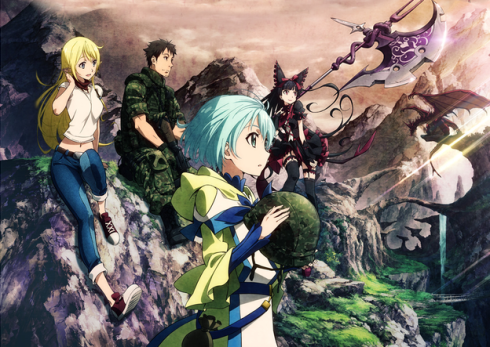 |
Last week, Frog-kun combed a range of Japanese sites to bring you some Japanese reactions to the GATE anime. However, the most loudly-expressed opinions even amongst domestic fans just barely skim the surface of the political maelstrom that lies beneath. That intense domestic debate over Japan’s security policy was alluded to in the key linked article, just beyond the part translated. In order to provide a bit more insight into that debate, I decided to translate the remainder of the article, so that English-speaking anime fans might have a better idea of what the fuss is all about.
Many, many thanks are due to Frog-kun, who generously let me use the part originally translated and checked my translation of the rest. Any mistakes or misinterpretations that remain are my own.
—karice
Is the JSDF anime GATE right-wing?
They smite their enemies with weapons and get the good-looking girls
Is GATE: Thus the JSDF Fought There!, a web novel that has been turned into an anime, a right-leaning piece of entertainment that tickles one’s patriotism? Writer and editor Iida Ichishi and sci-fi literary critic Fujita Naoya shrewdly tackle this question.
(This article/conversation was published online on August 20, 2015, after 7 episodes of the first series had aired.)
The original story began online 9 years ago.
Iida: Well then, on the topic of GATE. As an anime about the JSDF going to and fighting in another world, it’s become a huge subject of debate—as was expected even before it aired.
Fujita: Even though there are a lot of parts that would inevitably be criticized as “right-leaning entertainment,” I find it very interesting to watch. It’s directed by Kyogoku Takahiko, who also directed Love Live!. Whilst it’s a childish idea have a game world—a fantasy world that you’d find in something like Dragon Quest—connected to present day Japan, it’s interesting to see adults use their skills to bring it to the screen.
There’s just something fascinating about the notion of using modern weaponry to trample upon others with inferior technology. It reminded me of Hanmura Ryou’s G.I Samurai and Sam Raimi’s Army of Darkness.1 Fighting an army of the dead with chainsaws. There’s something of a superiority complex, of narcissism, in it.
However, if you were to depict modern warfare as it actually exists today, you’d be dealing with things such as drones, nuclear weapons and aerial bombing. In order to depict something akin to a pretend battle involving an army—i.e. tanks and soldiers—you probably need this kind of ‘imaginary enemy’.
To have the dead piling up like that makes for thrilling viewing. It’s also interesting that the main character, who’s a member of the JSDF, is an otaku. This might even be what it’s like if the otaku generation were to go to the battlefield. The protagonists sing magical girl anime theme songs as they are driving along, but in Full Metal Jacket, American soldiers were singing The Mickey Mouse (Club) March in Vietnam. I really felt the generation gap and irony inherent in that middle-aged soldier coming to understand that situation through the notion of a monster movie.
Iida: Well, the original story was began on the Internet 9 years ago, so it was probably written with the author never imagining that the world would turn out the way it has. I think it’s best to remember that.
Fujita: The anime adaptation was probably planned because of the current debates around the right to collective self-defense.
Iida: No, plans for the anime adaptation were probably underway three or four years ago, and while the Abe administration was talking about Abenomics back then, they were barely saying anything about reforming the right to collective self-defense in the Constitution, so I think it was a coincidence. The airing schedule wouldn’t have been decided right until the very last moment.
On a fundamental level, I don’t think GATE has a net uyo(Internet rightwing)-ish message. Even in the web novel, the protagonist Itami, a JSDF official, was non-political. He declared that he had never been to Yasukuni Shrine.2
Fujita: On that topic, though, the first Abe Cabinet (2006) upgraded the Japanese Defense Agency—formerly a bureau subordinate to the Cabinet—into a full Ministry.3 Abe also enacted the National Referendum Law, which paves the way for constitutional reform.4
Iida: During Abe’s first cabinet, the novel hadn’t even been published in tankobon format yet.
Fujita: The web novel is a product of its time. From the time of the first Abe administration, it was evident that he was trying to work towards reforming the constitution and reducing the restrictions on the JSDF.5 There are parts in the web novel that definitely resonate with the time it was made. In 2007, the Abe Cabinet declared an intention to seek constitutional reform.
Iida: I suspect the anime staff would not be pleased if people thought they were connected to the Abe administration. But then again, they probably want to avoid criticism just for including the JSDF. No matter how you handle the subject, you’d be criticised by both the left and the right.
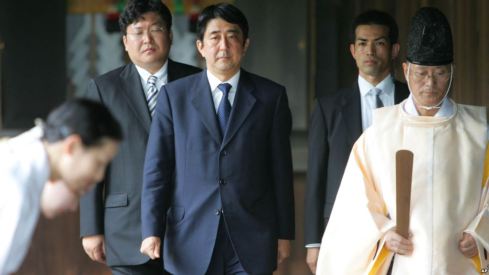 |
|
| Japanese Prime Minister Abe Shinzo at Yasukuni in December 2013. | |
Fujita: I’d argue that the creators must have known that depicting the JSDF at this time would have created a certain impression for those watching it, so they must have been prepared.
Iida: The other day, I had the chance to interview Yanai Takumi, the original author, and since the anime staff was nearby at the time, I asked, “Doing the series at this time will definitely be taken a certain way, right?” and he said, “No it’s just simple entertainment; I never thought about it at all.” It was just something he said while we were chatting, though. That the series doesn’t have a political motive.
Fujita: Yeah, right! lol. You can’t say it has no political element or that you can ignore it all just because it’s “simple entertainment.”
Be that as it may, what are your views on the show?
Making the JSDF personnel deployed to the other world such over-the-top characters is…
Iida: I’d already read the original novel—purely as a piece of entertainment—before all the hoohah. Take for example the earthquake that Yanai-san depicted in the story; that happened just before the 2011 Tohoku earthquake triple disaster. Yanai-san had originally planned to finish that part of the story and move on, but then judged that “It’s not good to run away from this,” and so proceeded to cover the characters trying to figure out what they should do after the in-story quake. These kinds of things make me think that the novel is quite sincere.
In the anime, I feel…that the girls, the weapons and the action are made too prominent. Because of the controversial set-up, the LN goes about creating some sort of ‘justification’ for it. But it seems like it’s been cut from the anime, whether for lack of time to cover it or various other reasons.
For example, the protagonist Itami comes across as someone who’s one minute wondering why there are so many casualties on the other world’s side, but then going “Woohoo! An elf!” the next. People have commented on how weird that is. But Itami’s background is something that is eventually covered in the novel, and before that, the anime versions of Itami and his colleague Kurata, who’s also an otaku, come across as being even more over-the-top. Especially Kurata.
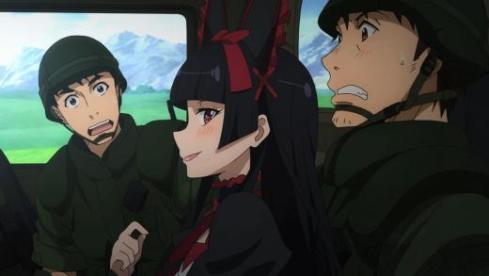 |
Fujita: It’s like their guilt for killing their opponents has been diluted, huh? Real soldiers would find that to be a pretty traumatic experience. That’s one of the things that also drew my attention.
Iida: For me, when reading the novel, it feels like ‘the JSDF’ is just a series of characters on the page, as in “Oh? So that’s the setting/set-up”? But when I watch the animated version, it feels like there’s a message I’m meant to be receiving. The effect is completely different. I don’t really get much of a fetish for military weapons in the novel, but it feels like its front-and-centre with the anime version.
Where is the line between fiction and reality?
Iida: Compared to the novel, the depiction of the SDF in the anime was definitely closer to their current state in the real world. As a result, the show makes you envision the real JSDF whether you want to or not. Apparently, someone who used to be in the JSDF is involved in checking the military settings material. If this really was just “simple entertainment,” then they could have made it something of a phony JSDF that would have come across as “pure fantasy.” Instead, they went for the real thing, though they also made the “I love bishōjo!” characteristics of the show’s JSDF personnel even more prominent. Given these two opposing directions, where should viewers draw the line between fiction and reality?
Fujita: I see. I’m the kind of person who enjoys it when stories mix reality and fiction together, so I find GATE interesting for that very reason. Of course, depending where fiction and reality overlap, there’s a high possibility that criticism will be severe. After all, they are using real-world politics in fiction.
Iida: Even in the novel, there’s stuff about loving bishōjo, and the JSDF plays a very active role. It’s fiction that’s obviously fictional, so it’s fun to read. But at the same time, with regards to questions such as “how should JSDF personnel behave in this situation?,” the super-fictional presentation itself justifies it. In the anime, it feels completely unrestrained. The story originally appeared as a web-novel, and such stories have a tendency to be about wish fulfillment. So when you cut out the justifications, wish fulfillment is all that remains.
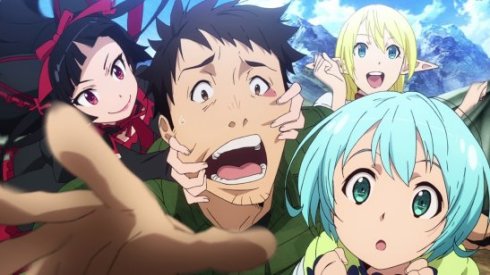 |
Fujita: Speaking in terms of political correctness, this is a work that will inevitably been seen as projecting onto another world one’s desire to invade other countries in the real world. In fact, that’s what I think GATE is all about.
Iida: No, I disagree with that interpretation. If that were indeed the case, then the enemies in the other world would be fashioned more like China or some other real country in our own world.
Is it better to have ‘justification’ or not?
Fujita: However, I think that leaving out those justifications (in the setting) allow you to extract more pleasure from the wish fulfillment aspects of the story, making it more interesting.
Iida: When a former JSDF member depicts the JSDF, I don’t think they’d do it without justifications…or rather, without thinking about things like its raison d’être or what kind of organization it should be. In fact, someone who doesn’t know about that reality would be more likely to just lay all of his/her desires straight out on the page.
Fujita: But anime is anime—it’s a part of the entertainment industry. Isn’t it inevitable for this to happen, all for the sake of increasing the pleasure and enjoyment that viewers get from the show?
Iida: How does that fit with what you were saying before? Do you mean “Well, then it’s fine for them to do whatever they want?”
Fujita: Even if it’s inevitable because that’s the way things are done within the industry, I believe that anime have an influence on the way people think and feel. I want to analyse that effect. I want to know the context of the eras in which these kinds of works become acceptable, or in which their creators think they’ve become acceptable. And if I think there are problems with it, I’ll criticise it.
Iida-san, where do you stand?
Iida: Rather than running away from it, I think they should face those difficult and troubling issues head on, presenting them to the viewers. Questions like “what would happen when the other world’s forces clash with the JSDF?” “How would surrounding countries act?” and “In an emergency, on what basis should the JSDF act?” The show would have been deeper than the original novel if they’d managed to do that—I’d have liked to have seen that.
Fujita: That’s a surprise. I didn’t expect to be the one defending what the anime creators did, lol.
Iida: I think GATE could have been a work that generated some good debates, whilst also succeeding as entertainment. Of course, this comes down to different interpretations of “what do you hope to see in GATE?” I wanted to see the show present the question “What is the JSDF?” to viewers, making them think about it not from the left or the right, but rather front on. That said, no matter what they do, just being an anime about the JSDF means that they can’t avoid being the object of controversy. I admire their guts for putting hand up in the midst of controversy, and I wouldn’t say I don’t commend their efforts.
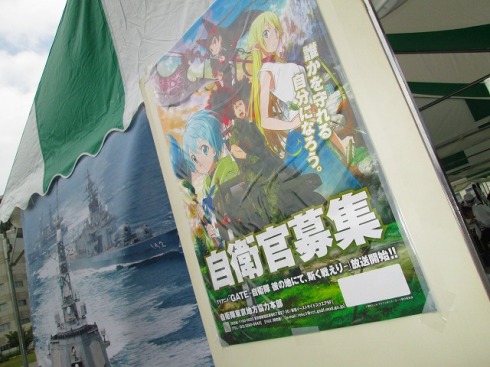 |
|
| GATE is actually being used in recruiting material for the real JSDF… | |
How is GATE different from other ‘military fetish’ series?
Fujita: This sense of “a lack of restraint” is also apparent in series such as Strike Witches and Kantai Collection.6 It’s a trend that’s escalated in recent times. It’s very different from the 1990s, when this country had something of an allergy towards the JSDF. It’s like “the times have changed.” On the one hand, there is a glamourous appeal in running wild (the pleasure gained from breaching ethical and other sorts of restraints); on the other hand, I do feel that it is dangerous for us to be heading down this path.
Iida: I don’t agree with that (interpretation). In the 1990s, no one got really angry about The Idol Defense Force Hummingbird, and few people tried to compare it to the real JSDF at the time. Going further back, we find the same thing for G.I. Samurai.7 In many ways, it’s a far more sensitive topic these days.
Fujita: However, I feel like the number of these kinds of series has increased.
Iida: But that’s only because it’s been a while since we’re seen the JSDF in an anime, right? There have been lots of ‘military fetish’ series. Library War also wasn’t about the JSDF.
Fujita: Perhaps there just aren’t many anime where the JSDF appear. Putting anime aside, when we consider the entire entertainment industry as a whole, I think that they’ve appeared more often. For example, in the drama Public Affairs Office in the Sky. The Idol Defense Force Hummingbird was an OVA, after all—it wasn’t made for the general public.
Iida: But OVAs back then are basically like late-night anime today. The latter aren’t made for the general public either.
Take Miyazaki Hayao as an example: to those who like weapons but dislike war, envisioning today’s JSDF fighting another country in order to depict those weapons and military forces is something they generally wouldn’t do. They wouldn’t want to connect an imaginary war with a real war. Even KanColle has a basis in historical fact, but the enemy is an unfamiliar entity, and the characters are warships that have been personified as bishōjo. But GATE uses present-day Japan as its stage, upon which the JSDF conducts operations of war. It thus comes a lot closer to reality, when compared with other ‘military fetish’ works. And that’s why the debate is so much fiercer.
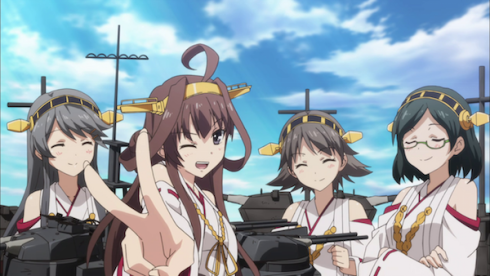 |
Iida: This contradicts what I said before, but half of me feels like “I wanted something that I could enjoy quietly, without all this fuss!”
Fujita: Personally, I think the show’s quite accomplished. It provides a fine taste of ‘the pleasure of invasion’, encompassing the notions of trampling upon a country with inferior technology, collecting bishōjo along the way, whilst also providing a reasonable alibi in that they’re ‘protecting (Japan)!’ To me, satisfying desires that aren’t acceptable in the real world through fiction is something that we do everyday anyway, but the way the “desires” are in GATE has a unique twist. I’ll be paying close attention to how and where this “twist” lands.
Imperial Japan’s invasion of other countries during Second World War, too, was premised on ‘lofty ideals’ such as ‘freeing them from the yoke of the West’. I think that boasting of one’s faults through a work about this kind of sadistic pleasure is, paradoxically, rather ethical. It’s a show that makes you aware that this kind of cruelty and pleasure can be found within yourself, and it makes you reflect upon it.
Disclaimer: None of the views expressed in this article are mine. I dropped GATE after just three episodes, so I won’t be able to answer questions about the show or the source novel. On the other hand, if you have any queries about Japan’s security policy, what the Abe administration is trying to do, or how the broader Japanese public has reacted, then I’ll try my best to share what I know. Alternatively, you can just follow some of the links below.
–karice
Notes
1. Army of Darkness has the ridiculous Japanese title of Captain Supermarket 「キャプテン・スーパーマーケット」.↩
2. Yasukuni Shrine is a Shinto Shrine in Tokyo that has been used since the Meiji Era to house the souls who have died in the service of the Emperor and thus the Japanese nation. In the latter sense, it’s similar to Arlington National Cemetery in the US. What’s controversial about Yasukuni, however, is that it also houses the souls of 1,068 war criminals, including 14 A-Class ones. The grounds also host a museum with a revisionist view of the Pacific War (WW2). Abe and many other Japanese politicians often visit the Shrine to pay their respects to the dead; this inevitably sparks backlash from Korea and China. However, it’s important to note that many Japanese people have complex feelings about the shrine—a branch of the group that supports visits to the Shrine has even passed a resolution asking the priests at Yasukuni to remove the souls of the 14. (Further reading, if anyone’s interested.)↩
3. The Japanese Defense Agency (JDA), first established in 1954, was unlike the Defense Ministries or Defense Departments in other sovereign states like the US, Australia etc. As an agency subordinate to the Cabinet (= the Japanese Prime Minister and the individuals that he has chosen to head the various Japanese Ministries), it did not have much of a say in shaping Japanese security policy. It was effectively relegated to managing policies determined by the Foreign Ministry and the PM’s office. The first Abe administration (2006-7) proposed a revision of the original 1954 law to upgrade the JDA to a Ministry, establishing the position of the Minister of Defense and thus giving it a bigger say in Japan’s national security policy. (Further reading.)↩
4. Article 96 of The Constitution of Japan allows for revision following a two-thirds majority vote in both houses of its parliament (which is known as the Diet) followed by a national referendum. The Constitution specified that the Diet should set the conditions for the referendum, and the National Referendum Law was passed in 2007 stating that only a simple majority would be required for the public vote. Given this rather late development, it shouldn’t be a surprise that Japan’s Constitution has never been modified since it was promulgated in 1946 (c.f. the 33 amendments of the US Constitution). Of course, what’s controversial is that the main aim of Japan’s conservatives has long been to revise Article 9, the (in)famous peace clause that appears to bar Japan from having a military… (Further reading.)↩
5. Because of Article 9, there has been much debate over what Japan’s Self-Defense Forces should actually be allowed to do ‘in self-defense’. As a concrete example of what this has entailed, when Japanese SDF engineers were deployed to Iraq to help in reconstruction efforts in 2004, there was a debate over whether they were allowed to defend themselves against attack. As such, they had to be protected by another military force (Australia’s). More recently, the debate has been about whether the JSDF should be allowed to participate in ‘collective self-defense’. That is to say: whether it can defend another country or its people, by, for example, shooting down intercontinental missiles that have been launched at the US etc etc.↩
6. I assume most of you will have heard of Strike Witches and Kantai Collection, since they’re pretty recent titles. The article points Japanese readers to further discussion in a book titled Bunka Boukoku-ron (A Theory of Destructive Culture—thanks, Frog-kun!), where Fujita and Kasai Kiyoshi devote one chapter to the topic of ‘right-wing entertainment’.↩
7. The Idol Defense Force Hummingbird consisted of four OVAs released between 1993-1995. The G.I. Samurai novel was published in 1974, and a film based on it was released in 1979. The Japanese title is Sengoku SDF 「戦国自衛隊」.↩
And for even further reading
If you’re interested in making your own informed conclusions about Abe and his intentions with regards to Japanese security policy—that is to say, if these extensive notes have not already bored you to death—these two articles present quite a comprehensive and nuanced view of many of the debates you’ll need to know. I’d also suggest following some of their links.
Pingback: A decade (or so) of translation… | HOT CHOCOLATE IN A BOWL